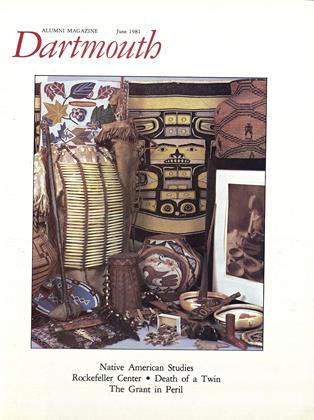ERNEST HEMING WAY: SELECTED LETTERS 1917-1961 Edited by Carlos Baker '32 Scribner's, 1981. 948 pp. $27.50
Ernest Hemingway came on as a hardnosed, battle-scarred roughneck of expatriate American literature, at a time when E. E. Cummings was sneering at Harvard and when F. Scott Fitzgerald and then John O'Hara were thought rather odd because they took Princeton and Yale seriously. But all Hemingway's hunt ing, fishing, submarine-hunting, and guerrilla warfare could not save him from the professors and the strange shrine of the Hemingway Room in the John F. Kennedy Memorial Library.
The academic lifetime of Carlos Baker, professor of English at Princeton, has been centered on Hemingway; the dust jacket of the Selected Letters announces that Baker's biography "is now accepted as the standard work." But Baker is not exclusive; he prints many letters in which Hemingway damns Charles Fenton, Philip Young, and others among Baker's competition. His broamindedness goes further: Although Baker prints many private letters, he generously adds many in which Hemingway expresses his dislike of personal publicity and his refusal to have his letters "ever 'consulted' by any of the personal approach critics; or any critics or biographers."
One characteristic of these letters is their nastiness; as the casual damning of "jigs" and "kikes" decreases, the bloodthirstiness rises. "I like to shoot a rifle and I like to kill," Hemingway notes; and after World War II he repeatedly boasts a score of 122 dead humans, including a prisoner of war whom he deliberately gut-shot, as he reports in detail. Baker refrains from comment. Another characteristic: "I certainly write an almost il- literate letter." Here Baker helps, occasionally. He offers "there [their] house," for instance, but ignores "when you wanto find them their in their holes" and "You're write about the Murphy's."
But Baker loses interest in the editing game about one-third through the selection, and he lowers his commentary below what one might have considered a minimal level. The letters float in a void, with wives and continents coming and going almost unnoted. Professor Baker may be a bit tired of Hemingway.
J. D. O'Hara teaches at the University ofConnecticut and frequently reviews books forthe ALUMNI MAGAZINE and other publications.
 View Full Issue
View Full Issue
More From This Issue
-
 Feature
FeatureDeath and Reunion: the loss of a twin
June 1981 By George L. Engel -
 Cover Story
Cover StoryThe Long-Deferred Promise
June 1981 By Shelby Grantham -
 Feature
FeatureRockefeller Center: the ideal of reflection and action
June 1981 By Donald McNemar -
 Feature
FeatureA Dull Little Bug Imperils the College Grant
June 1981 By Ted Winterer -
 Article
ArticleDartmouth Authors
June 1981 -
 Article
ArticleThe National Committee
June 1981
Books
-
 Books
BooksHAWAII WITH SYDNEY A. CLARK,
June 1939 By Alexander Laing '25 -
 Books
BooksA MIRROR FOR AMERICANS. LIFE AND MANNERS IN THE UNITED STATES 1790-1870 AS RECORDED BY AMERICAN TRAVELERS.
January 1953 By ALEXANDER LAING '25 -
 Books
BooksAMATEURS AT WAR
June 1943 By H. F. West -
 Books
BooksTHE BOORN MYSTERY
November 1937 By H. H. Jackson -
 Books
BooksVIETNAM CRISIS: A DOCUMENTARY HISTORY.
JULY 1971 By JONATHAN MIRSKY -
 Books
BooksAPPLIED PSYCHOLOGY,
November 1948 By Samuel Feldman.


